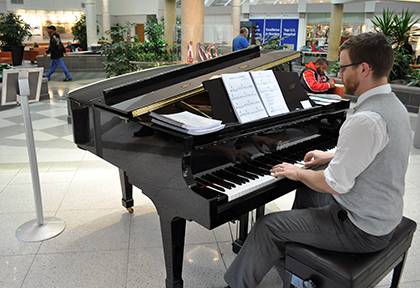Music as the Best Medicine
Patients, visitors and employees enjoy musical performances at Duke Hospital

As hospital staff and visitors sit in plush chairs of the Duke Hospital lobby, checking phones or taking a snack break, William Dawson slides onto a piano bench and plays the beginning chords of “Across the Universe.” During Dawson’s two-hour performances on Thursdays, children in wheelchairs shyly approach and request “Twinkle Twinkle Little Star.” Dawson strikes up conversations with listeners and hands them a songbook of 200 songs, from Beatles to 1940s jazz hits, encouraging them to pick a favorite. When he’s not performing in the lobby, Dawson visits patients, playing a variety of instruments. He’s played “Happy Birthday” on an accordion for a patient who received a serious diagnosis. He’s performed “Diamonds Are a Girl’s Best Friend” to laughing elderly patients and classical guitar for tiny babies in Duke’s transitional care nursery. “I can tell if they want a song to give them a release,” said Dawson, who spent two years touring and performing internationally with the platinum-selling Squirrel Nut Zippers. “And they cry. They want to cry. And sometimes, people want to come up and laugh and sing along. Sometimes it’s a party. And sometimes, it’s a memorial.”Dawson is one of six musicians who play in the Duke University Health System every week through one of the longest running programs, Artists in Residence, for Arts & Health at Duke, which brings literary, performing and visual arts programming to Duke Hospital patients and employees.The artists in residence and student volunteers play about 25 hours of music per week in the hospital, performing bedside, in the concourse and in waiting rooms. Musicians play violin, piano, sing or even play unusual instruments such as the kora, a 21-string West African harp lute.
In the hospital concourse, about 600 visitors, patients and staff can walk through in an hour, making the performance space about as visible as a sold-out show in Baldwin Auditorium. Sharon Swanson, program coordinator for Arts & Health at Duke, said music can trigger comforting memories within patients, lower blood pressure, and ease anxiety during treatments and tests.“Whenever people are sick or under stress, they reach back to things in their younger life that comforted them,” Swanson said. “Music is a huge part of that. It touches a part of all of us, and you don’t have to be a musician to appreciate that.”Another of Arts & Health’s artists in residence, Helen Wolfson, is known as the “dulcimer lady.” She performs a variety of music, including Celtic, classical and original compositions on her hammered dulcimer, a trapezoidal stringed instrument played with small wooden mallets. She has played at Duke since 2004 in patient rooms, the Adult Bone Marrow Transplant Clinic, waiting rooms and lobbies. Sometimes, her listeners fall asleep to the soft melodies. “It’s a way to take them out of the pain and just into the present,” Wolfson said. “This work can be exhausting, but it can also be joyful and energizing. Every time I come home, I feel like I made a difference for somebody.”
Read More